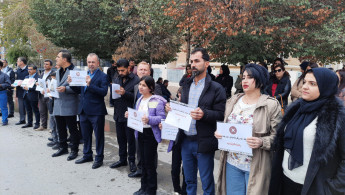School year in Iraqi Kurdistan at risk as KRG ignores teachers' demands
In the Iraqi Kurdistan region, the current school year is hanging in the balance as public sector teachers in Sulaimaniyah and Halabja provinces and surrounding areas continue to boycott classes since mid-September due to unpaid salaries.
While Erbil and Duhok provinces are unaffected, the Kurdistan Regional Government (KRG) faces criticism for its failure to address the financial concerns of teachers and public sector employees.
On Thursday, 16 November, the KRG Minister of Education, Alan Hama Saed, said in a press conference that students, particularly those in the 12th stage, should not be concerned and his ministry will "safeguard their rights."
He also dismissed circulating allegations regarding the possible dismissal of the school year by the United Nations Educational, Scientific and Cultural Organization (UNESCO), affirming his ministry has the only authority to postpone the school year.
It’s a crime that the academic year in some parts of Kurdistan Region has not started yet due to salary payment delays.
— Yerevan Saeed (@YerevanSaeed) November 16, 2023
While teachers have legitimate grievances, we all have a responsibility towards the children.
My education is product of teachers who were no paid in 1990s.
The New Arab contacted Saman Siwaili, spokesperson of the KRG Ministry of Education, and Dilshad Omar, director-general of education in Sulaimaniyah, but they refused to speak for the press.
"Boycotting the classes by the teachers has created an unstable condition for the educational process, but the KRG shoulders the responsibility of resuming the classes and fulfilling the teachers' demands," Othman Gulpi, a secondary school teacher and activist, told TNA in a phone interview. "I think it is not too late, and the government can fulfil some demands of the teachers and the public sector employees, namely paying salaries of the past two months, resuming pay rises, and employing non-permanent teachers."
He also clarified that if teachers see a "serious will" by the KRG to implement some of those critical demands, they will break their strikes; otherwise, the teachers will continue. He stressed that the KRG is yet to formally address their demands despite they have made several large demonstrations.
While teachers under the Iraqi federal government have been paid November salaries, teachers and other employees of the KRG are yet to receive September salaries.
In contrast to the fact that nearly 700,000 Kurdish pupils have so far been deprived of public education, a small number of sons and daughters of wealthy families continue with their education at private sector schools.
Gulpi indicated that education is one unified package, and if the KRG decides to postpone the current school year, the private schools must also delay the process.
Non-permanent teachers in the region, numbering more than 35,000, receive nearly 400,000 Iraqi dinars per month (about US$250) to teach in rural areas and districts.
The autonomous government of Iraqi Kurdistan has frozen and halted pay rises to all public sector employees since 2016, when oil prices plummeted, and Kurdish fighters were battling the Islamic State group 2016 without approval from the region's parliament.
However, the KRG has recently resumed pay raises to Kurdish security, Peshmerga forces, and judges.
Nearly 1.5 million people are on the KRG public sector payroll, most of whom are ruling party members. Critics say they are hired with little or no real expertise and often fail to come to the office.
On the other hand, tens of thousands of university graduates remain unemployed amid rising unemployment rates and poverty.
An alliance of three ruling Kurdish parties takes part in the KRG - the Kurdistan Democratic Party (KDP), the Patriotic Union of Kurdistan (PUK), and the Movement of Change (Gorran).
In June, Iraq's parliament approved a three-year budget bill of nearly 198.9 trillion dinars (US$153 billion), the largest in the country's history.
According to the law, the semi-autonomous Kurdish region must first deliver 400,000 barrels per day (bpd) to the federal authorities, along with half of the non-oil revenues, before receiving a share of 12.6 per cent of the federal budget.
The KRG has said it needs 940 billion Iraqi dinars (US$602 million) to pay monthly salaries to over 1,200,000 civil servants but cannot do so if Baghdad does not regularly send its share from the budget.
While KRG officials stress they have fulfilled their obligations under the budget law, Iraq has not sent its share from the federal budget, thus preventing the payment of KRG employees. Iraqi officials say Erbil has not fully abided by the law.





 Follow the Middle East's top stories in English at The New Arab on Google News
Follow the Middle East's top stories in English at The New Arab on Google News


